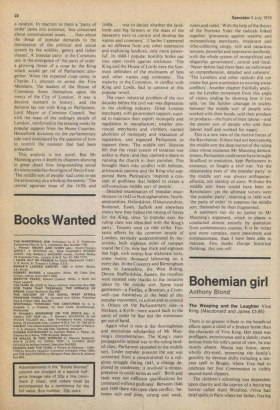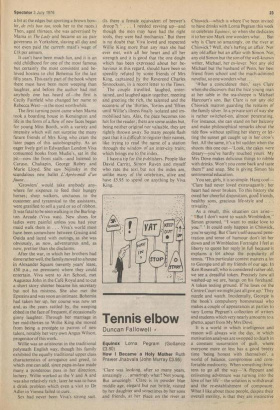Bohemian girl
Anthony Blond
The Weeping and the Laughter Viva King (Macdonald and Janes £5.95) There is no greater tribute to the beneficial effects upon a child of a broken home than the character of Viva King. Her papa was profligate, promiscuous and a dandy; more serious from his wife's point of view, he was mostly absent. Mama was brave, never wholly dry-eyed, preserving the family's gentility by devious shifts including a tenyear spell in Bruges, where Viva had to celebrate her first Communion in visibly second-hand slippers.
The children's schooling was dependent upon charity and the caprice of a hectoring horror called Aunt Winifred. (Viva had brief spells in Paris where her father, fraying
a bit at the edges but sporting a brown bowler, de tres bon ton, took her to the races.) Then, aged thirteen, she was advertised by Mama in The Lady and became an au pair governess in Yorkshire, slaving all day and not even paid the currerit maid's wage of £18 per annum.
It can't have been much fun, and it is an odd childhood for one of the most famous but certainly the most consistent and beloved hostess to chit Bohemia for the last fifty years. This early part of the.book where there must have been more weeping than laughter, and before the author had met anybody one has heard of—the first is Cecily Fairfield who changed her name to Rebecca West—is the most worthwhile.
The first turning point came when Mama took a boarding house in Kensington and life in the form of a flow of new faces began for young Miss Booth, with a variety and intensity. which will not surprise the many future friends of Mrs King who cram the later pages of this autobiography. As an eager lively girl in Edwardian London Viva consumed books from Mudie's, sat in the pit—now the front stalls—and listened to Caruso, Chaliapin, George Robey and Marie Lloyd. She saw Nijinsky in the scandalous new ballet L'Apres-midi d'un faune.
'Growlers' would take anybody anywhere for sixpence to feed their hungry horses; shop walkers, unctuous to the customer and tyrannical to the assistants, were gratified to sell a yard or so of ribbon. It was fatal to be seen walking in the Burlington Arcade (Viva was). New shoes for ladies were painful unless you had your maid walk them in . . . Viva's world must have been somewhere between Gissing and Ouida and laced with outings, as she was obviously, as now, adventurous and, as now, prettier than she disclaims.
After the war, in which her brothers had done rather well, the family moved to a house in Alexander Square (seventy years' lease, £30 p.a., no premium) where they could entertain. Viva went to Art School, met Augustus John in the Café Royal and to cut a short story shorter became his secretary but not his mistress. She also met the Epsteins and was soon an intimate. Bohemia had taken her up, her course was now set and, as the years rattled by, the weeping ebbed in the face of frequent, if occasionally ginny laughter. Through her marriage in her mid-thirties to Willie King she moved from being a protegee to patron of new talent, notably her very own Angus Wilson, progenitor of this work.
Willie was an aristocrat in the traditional polymath English way, though his family exhibited the equally traditional upper class characteristics of arrogance and greed, to which one can add, since papa-in-law made many a ponderous pass in her direction, lechery. Willie worked at the V and A and was also relatively rich ; later he was to have a drink problem which even a visit to Dr Adler in Vienna failed to cure.
Sex had never been Viva's strong suit.
(Is there a female equivalent of brewer's droop ?) ' . . I needed revving up—and though the men may have had the right tools, they were bad mechanics.' But there is no doubt that Viva loved and respected Willie King more than any man she had ever met, with all her heart and all her strength and it is good that the one doubt which has been expressed about her behaviour in this regard, should have been so speedily refuted by some friends of Mrs King, captained by the Reverend Charles Sinnockson, in a recent letter to the Times.
The couple travelled, laughed, entertained, and laughed again together, meeting and greeting the rich, the talented and the eccentric of the 'thirties, 'forties and 'fifties until Willie's illness finally isolated and immobilised him. Alas, the pace becomes too hot for the reader ; there are some asides but, being neither original nor valuable, they are rightly thrown away. So many people flash past that it is difficult to register their names, like trying to read the name of a station through the window of an inter-city train; which brings me to the index.
I have a tip for the publishers. People like David Carritt, Simon Raven and myself who rate the text but not the index are, unlike many of the celebrities, alive and have £5.95 to spend on anything by Viva King.



































 Previous page
Previous page